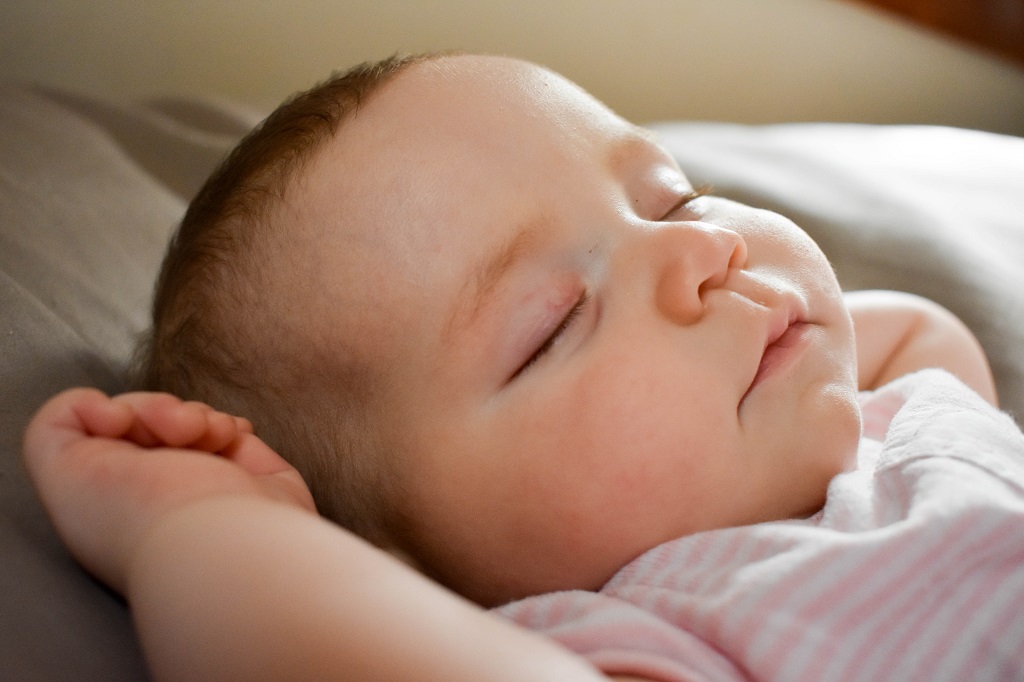“It’s like a switch went off and suddenly she wont sleep.” A story I’ve heard all too often. Some parents even go over their previous days or changes in routine in painstaking detail so they can try to predict what they did “right “or “wrong.”
I’m here to tell you that it’s likely not something you did but instead that your baby is going through a healthy, normal part of their development. My name is Bridget Jensen and I’m an experienced sleep consultant. Every day, my colleagues and I hear from tired families across North America who are completely exhausted.
While we hear from all age groups, our most common inquiry ages are 4 months, 9 months, and 16 months. That’s no coincidence – those are ballpark ages for common sleep “regressions”. Let’s have sleep regressions explained.
Regression or Progression?

If it were up to me, I’d change the phrasing around the term “sleep regression” altogether, perhaps instead calling it a sleep “progression”. Changes in sleep patterns and behaviours are a normal part of babyhood/childhood and even adulthood. Viewing this temporary impact on sleep as a “regression” can really take the wind out of your sails.
The good news is that, when our babies are going through sleep regressions, it means they are going through a leap in development. In other words, they are doing their job! Learning about what their bodies are capable of, learning that they’re a separate person from their caregiver and so much more.
You may even witness your little one practicing some of these new-found skills in their crib (such as rolling over, making new sounds, pulling themselves up, walking around the crib, etc.). Not to worry, as this is all normal behavior. This is another reason why it’s extremely important to ensure your child’s sleep space is as safe as possible.
Ideally, you would be able to relax in the evening/night when your baby is in their dedicated sleep space. Ensuring the crib mattress is firm with tight fitted sheets (and nothing else in the crib) goes a long way. It helps to double check for any cords or items within your baby’s reach, as well as lower the crib to the lowest settings. These simple measures can make all the difference when it comes to safety.
Are sleep regressions normal?
It feels great to have your baby sleeping peacefully and routinely (even if things aren’t in a perfect pattern). So when your good sleeper starts to resist naps, have short naps, or wakes more in the night, it can make you feel defeated. Not to fret! This is a normal and healthy part of your baby’s development. Let me explain.
All of us cycle through sleep all night long (and even during daytime naps). Depending on where we’re at in our sleep cycle, we may be in a lighter or deeper phase of sleep. This means that there are times where we are more easily pulled from sleep. This is especially true in the wee hours of the morning or part way through a nap. After all, at that point we would have had some sleep which would decrease our sleep pressure (how tired we feel).
Read also: When Do Toddlers Stop Napping?

There are some things in your sleep environment that can impact this such as how dark the space is, if your baby is wearing overnight diapers and if white noise is being used. These factors can help rule out discomfort due to feeling wet, too much light in the room and neighbourhood and household noises.
Not all babies experience sleep regressions
On the other hand, not everyone will notice changes in their little one’s sleep. Sometimes, babies move through their leaps/learning new skills without an impact noticed on their sleep. This doesn’t mean there is anything wrong. Every baby is different and therefore experiences these milestones in their own way. I even see twins and triplets whose developmental timelines differ between siblings.
Not only is the name “regression” not ideal, but the commonly used names we tend to see the most of can be misleading. As a new parent, you may hear about these three sleep regressions (even if your baby experiences theirs at a different time): 4-months, 9-months and 18/20 months. Let’s dive a little deeper into each of these:
4-Month Sleep Regression
The way your baby sleeps from birth until 13-14 weeks starts to change as they grow into their fourth month. This is likely why we hear the name “4-month-sleep regression.” In reality, parents may notice changes in sleep behaviours sometime between 3.5 months and 5 months. Some parents report less leg kicking, less startle reflex and resisting the swaddle.
Every baby has their own timeline, and will hit their developmental milestones in good time. The 5-6 month stretch can also bring along sleep disruptions due to digestion discomfort from trying new foods, teething, etc.
9-Month Sleep Regression
Just like mentioned above, the name “9-month” sleep regression is also deceiving. This can be experienced somewhere between 8 and 10 months – or not at all! Some common behaviours we see around this time are: experiencing big feelings around separation from their parent(s), standing/pulling themselves up in the crib and extended wakes in the night.
Some of my clients like to call this the “2:00am party.” It can look like your baby waking up in the middle of the night for no apparent reason and staying awake for an extended period. They could be happy, upset or even just practising some new skills in their crib. So, what do we do? If your baby is in a safe sleeping space and not in distress, you can simply let them be. Many of us parents will lay there staying awake while our baby is awake (as it can be so hard to fall asleep knowing that our baby is wide awake).
Resist the temptation to go in and interfere, as they will find their way back to sleep eventually. Unless there is a genuine need, try to avoid changing anything. Note that I would consider a genuine need to be something like a diaper change, crying, baby in an uncomfortable position, etc.
Toddler Sleep Regression

Around 18-20 months, we can see some exciting changes with our toddlers as they really lean into their own personalities. This can sometimes come with major sleep disruptions as they learn about how their behaviour can control their sleep. After all, there are few things a toddler can really control: food, sleep and toileting (the toileting can be much later).
I often get calls from families who have quickly ditched the crib – sometimes even in the middle of the night! – due to this “regression”. Unless your baby is actively escaping the crib (and even then, there are many things we can do to help!), you should avoid switching them to a toddler bed/regular bed until as close to age three as possible. Keeping your baby in a crib will ensure they are safe, as they do not understand the responsibility of staying in their bed.
Other factors to consider during the toddler sleep regression are screen-time, milk/dairy before bed and sleep timing. I often see toddlers over 20 months who wake frequently in the night. When I recommend limiting dairy (milk or yogurt drinks) before bed, I see an almost immediate decrease in how often the baby wakes. Screen-time before bed can not only impact how your little one falls asleep, but how soundly they’ll sleep through the night.
Consider switching over to screenless activities before bed to help get the mind and body ready for sleep. Finally, take a deeper look at your timing. Is your little one getting really clumsy, silly and bouncing off the walls at bedtime? Or perhaps they are becoming easily upset and agitated? In this case, it could be that bedtime is much too late. Bring bedtime somewhere between 6:30-8:00pm (all depending on any daytime sleep and what tired cues they are showing).
Will My Baby Ever Sleep Again?
It’s very likely that after your baby has gone through their leap in development (or once the novelty of their new skill wears off!), they will sleep well again.
A big fear I hear about is that the baby will start to develop some “bad habits” and not sleep well again. There are also many babies who never really “slept well” in the first place, so the regression can hurt that much more. Remember: you are the expert on your baby. If you suspect they aren’t getting enough sleep/restorative sleep, there is help available. Gone are the days where we had to just work it out on our own. There is a worldwide community of sleep experts available to you.
It can be so incredibly tempting to make a changes to your child’s sleep when they’re going through a regression, but try not to act too quickly! Most sleep regressions last 1-2 weeks, or up to 3-4 weeks in some cases. Oftentimes, they tend to resolve themselves on their own. If it’s been a few weeks and your little one has picked up some not-so-desirable bedtime/night habits, that’s where we come in. Avoid rocking the boat too soon.
If you find that your baby goes through a big developmental leap (or even any other change like moving, new time zone, etc.), don’t hesitate to reach out for help.
Sleep regressions (progression!) are a normal, healthy part of childhood development.
Read also:
- 3-Month Sleep Regression Explained
- 4 Month Sleep Regression Explained
- 6-Month Sleep Regression Explained
- 8 Month Sleep Regression Explained
- 9 Month Sleep Regression Explained
- 16-Month Sleep Regression Explained
- 18-month Sleep Regression Explained
- 20-Month Sleep Regression Explained
Bridget Jensen is a baby sleep expert and Canadian Director of the Association of Professional Sleep Consultants. She is dedicated to helping people get the rest they need, so they can feel at their best during the day. She is the founder of Better Bedtime, a full-service sleep consultancy based in Ontario, Canada.
betterbedtime.ca @betterbedtimesleep
